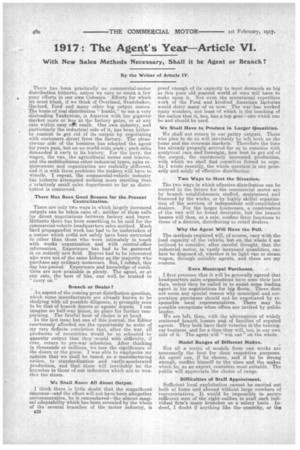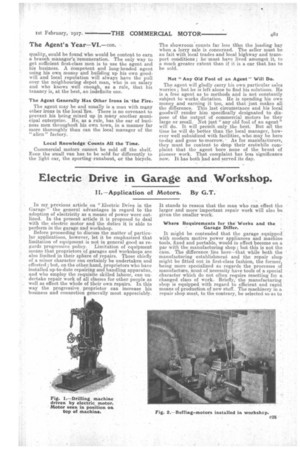1917: The Agent's Year—Article VI.
Page 4

Page 5

If you've noticed an error in this article please click here to report it so we can fix it.
With New Sales Methods Necessary, Shall it be Agent or Branch ?
By the Writer of Article IV.
.There has been practically no commercial-motor distribution hitherto, unless we care to count a few puny efforts in our own Colonies. Efforts for which we must blush, if we think of Overland, Studebaker, Garford, Ford and many other big output names. The home of real distribution "hustle," to use a very misleading Yankeeism, is America with her gigantic market more of less at the factory gates, or at any rate within easy rl reach. Our own industry, and particularly the industrial side of it, has been hitherto content to get rid of its output by negotiating with customers direct from the factory. The pleasure-car side of the businesa has adopted the agent for years past, but on no world-wide scale ; such sales demanded it early in its history. For the lorry, the wagon, the van, the agricultural motor and tractor, and the multitudinous other industrial types, sales requirements and organization are radically different, and it is with these problems the makers will have to wrestle. I repeat, the commercial-vehicle industry has hitherto attempted nothing more startling than a relatively small sales department .so far as distribution is concerned.
There Has Been Good Reason for the-Present Centralization.
There are only two ways in which largely increased outputs can be taken care of ; neither of them calls for direct negotiations between factory and buyer. Hitherto there has been something to be said for the commercial-vehicle headquarters sales method. Much hard propagandist work has had to be undertaken of a nature which could not safely have been entrusted to other than those who were intimately in touch with works organization and with central-office information. Experience has had to be garnered in an entirely new field. Buyers had to be interested who were not of the same kidney as the majority who plirehase any ordinary motorcars. But, I submit, this day haspassed. Experience and knowledge of conditions are now available in plenty. The agent, or at any rate, the best of him, can wellbe trusted to "carry on!'
Branch or Dealer?
An aspect of the coming great distribution question, which some manufacturers are already known to be studying with all possible diligence, is promptly seen to be that of branch depots or agents' depots. I can imagine no half-way house, no place for further tem}Arising. The fateful hour of choice is at hand. In the last issue but one of this journal, the Editor courteously afforded me the opportunity to write of my very definite conviction that, after the war, all producers of necessities would be so schooled to quantity output that they would with difficulty, if ever, return to pre-war schedules. After thinking 'in thousands or millions, we lose the significance of the dozen or the gross. I was able to emphasize my opinion that we enall be tuned, as a manufacturing nation, to standardization and vastly-accelerated production, and that these will inevitably be the keynotes to those of our industries which are to weather the storm.
We Shall Know All About Output.
I think there is little doubt that the magnificent response—and the effort will not have been altogether unremunerative, be it remembered—the almost magical adaptability which has been revealed by the whole of the several branches of the motor industry, is C22 proof enough of its capacity to meet demands as big as this poor old scarred world of ours will have to make upon it. Not even the sensational repetition work of the Ford and kindred American factories would deter many of us now. The war has worked many wonders, not least of which is the teaching of the nation that it, too, has a top gear—one which can be and should be used.
We Shall Have to Produce in Larger Quantities.
We shall not return to our paltry outputs. Those who plan to do so will inevitably be left both on the home and the overseas markets. Therefore the time has alreadjaproperly arrived for us to consider with analytical care and foresight, how best to get rid of the output, the enormously increased production, with which we shall find ourselves forced to cope. As I wrote recently, the whole question is one primarily and solely of effective distribution.
Two Ways to Meet the Situation.
The two ways in which effective distribution can be secured in the future for the commercial motor are by branch establishments staffed, maintained and financed by the works, or by highly skilful organization of the services of independent self-established dealers. For the larger businesses, a combination of the two will be found desirable, but the' branch hauses widl then, as a rule, confine their functions to those of a district, distributing to retail dealers.
Why the Agent Will Have the Pull.
The methods required will, of course, vary with the load capacity of the vehicle, but on the whole I am inclined to consider, after careful thought, that the industrial motor, in vastly increased quantities, can best be disposed of, whether it be light van or steam wagon, through suitable agents, and these are my reasons.
Even Municipal Purchases.
I first presume that it will be generally agreed that headquarters sales organizations have seen their last days, unless they be called in to assist some leading agent in his negotiations for big fleets. There does not seem any special reason why municipal and corporation purchases should not be negotiated by responsible local representatives. There may be possible exceptions when offers are invited by public tender.
We are left, then, with the alternatives of widely scattered branch houses and of families of reputed agents They both have their votaries in the touringear business, and for a time they will, too, in our own side of it. The agent will "win out' • on the whole.
Model Ranges of Different Makes.
Not all a series of models from one works are necessarily the best for their respettive purposes. An agent can, if he choose, and if he be strong enough, confine himself to the sizes and the makes which he, as an expert, considers most suitable. The public will appreciate the choice of range.
Diffibulties of Staff Appointment.
Sufficient local exploitation cannot be carried out both at home and abroad without large numbers of representatives. It would be impossible to secure sufficient men of the right calibre to staff each individual firm's many branches on a salary basis. Indeed, I doubt if anything like thequantity, or the
quality, could be found Who would be content to earn a branch manager's remuneration. The only way to get sufficient first-class men is to use the agent and his business. A oompetent and long-headed agent using his own money and building up his own goodwill and local reputation will always have the pull over the neighbouring depot man, who is on salary and who knows well enough, as a rule, that his tenancy is, at the best, an indefinite one.
The Agent Generally Has Other Irons in the Fire.
The agent may be and usually is a man with many other irons in the local 'fire. There is no covenant to prevent his being mixed up in many another municipal enterprise. He, as a rule, has the ear of business men throughout his own town, in a manner far more thoroughly than can the local manager of the "alien" factory.
Local Knowledge Counts All the Time.
Commercial motors cannot be sold off the shelf. Even the small van has to be sold far differently to the light car, the sporting runabout, or the bicycle. The showroom counts far less tlfan the loading bay when a lorry sale is concerned. The seller must be au fait with local trades and local highway and transport conditions ; be must have lived amongst it, to a much greater extent than if it is a car that, has to be sold.
Not "Any Old Fool of an Agent" Will Do.
The agent will gladly carry his own particular sales worries ; but he is left alone to find his solutions. He is a free agent as to methods and is not constantly subject to works. dictation. He is spending his own money and earning it too, and that just makes all the difference. This last circumstance and his local goodwill render him specifically designated to dispose of the output of commercial motors be they large or small. Not just "any old fool of an agent" will do. It will permit only the best. But all the time he will do better than the local manager, however well subsidized with facilities, who may be here to-day and gone to-morrow. As for manufacturers, they must be content to drop their erstwhile complaint that the agent bore none of the brunt of pioneer work. That complaint has less "significance now. It has both had and served its day.
























